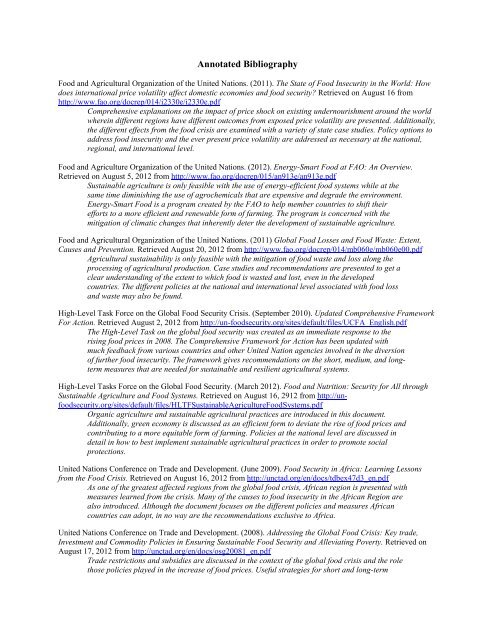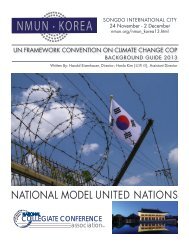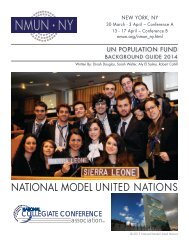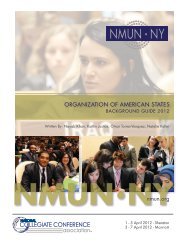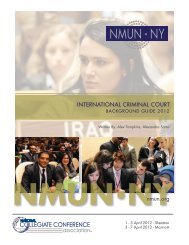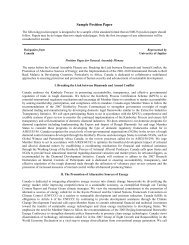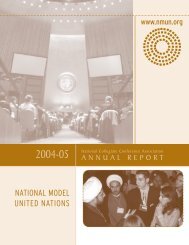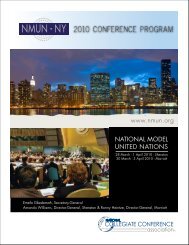UNCTAD Background Guide - National Model United Nations
UNCTAD Background Guide - National Model United Nations
UNCTAD Background Guide - National Model United Nations
Create successful ePaper yourself
Turn your PDF publications into a flip-book with our unique Google optimized e-Paper software.
Annotated Bibliography<br />
Food and Agricultural Organization of the <strong>United</strong> <strong>Nations</strong>. (2011). The State of Food Insecurity in the World: How<br />
does international price volatility affect domestic economies and food security? Retrieved on August 16 from<br />
http://www.fao.org/docrep/014/i2330e/i2330e.pdf<br />
Comprehensive explanations on the impact of price shock on existing undernourishment around the world<br />
wherein different regions have different outcomes from exposed price volatility are presented. Additionally,<br />
the different effects from the food crisis are examined with a variety of state case studies. Policy options to<br />
address food insecurity and the ever present price volatility are addressed as necessary at the national,<br />
regional, and international level.<br />
Food and Agriculture Organization of the <strong>United</strong> <strong>Nations</strong>. (2012). Energy-Smart Food at FAO: An Overview.<br />
Retrieved on August 5, 2012 from http://www.fao.org/docrep/015/an913e/an913e.pdf<br />
Sustainable agriculture is only feasible with the use of energy-efficient food systems while at the<br />
same time diminishing the use of agrochemicals that are expensive and degrade the environment.<br />
Energy-Smart Food is a program created by the FAO to help member countries to shift their<br />
efforts to a more efficient and renewable form of farming. The program is concerned with the<br />
mitigation of climatic changes that inherently deter the development of sustainable agriculture.<br />
Food and Agricultural Organization of the <strong>United</strong> <strong>Nations</strong>. (2011) Global Food Losses and Food Waste: Extent,<br />
Causes and Prevention. Retrieved August 20, 2012 from http://www.fao.org/docrep/014/mb060e/mb060e00.pdf<br />
Agricultural sustainability is only feasible with the mitigation of food waste and loss along the<br />
processing of agricultural production. Case studies and recommendations are presented to get a<br />
clear understanding of the extent to which food is wasted and lost, even in the developed<br />
countries. The different policies at the national and international level associated with food loss<br />
and waste may also be found.<br />
High-Level Task Force on the Global Food Security Crisis. (September 2010). Updated Comprehensive Framework<br />
For Action. Retrieved August 2, 2012 from http://un-foodsecurity.org/sites/default/files/UCFA_English.pdf<br />
The High-Level Task on the global food security was created as an immediate response to the<br />
rising food prices in 2008. The Comprehensive Framework for Action has been updated with<br />
much feedback from various countries and other <strong>United</strong> Nation agencies involved in the diversion<br />
of further food insecurity. The framework gives recommendations on the short, medium, and longterm<br />
measures that are needed for sustainable and resilient agricultural systems.<br />
High-Level Tasks Force on the Global Food Security. (March 2012). Food and Nutrition: Security for All through<br />
Sustainable Agriculture and Food Systems. Retrieved on August 16, 2912 from http://unfoodsecurity.org/sites/default/files/HLTFSustainableAgricultureFoodSystems.pdf<br />
Organic agriculture and sustainable agricultural practices are introduced in this document.<br />
Additionally, green economy is discussed as an efficient form to deviate the rise of food prices and<br />
contributing to a more equitable form of farming. Policies at the national level are discussed in<br />
detail in how to best implement sustainable agricultural practices in order to promote social<br />
protections.<br />
<strong>United</strong> <strong>Nations</strong> Conference on Trade and Development. (June 2009). Food Security in Africa: Learning Lessons<br />
from the Food Crisis. Retrieved on August 16, 2012 from http://unctad.org/en/docs/tdbex47d3_en.pdf<br />
As one of the greatest affected regions from the global food crisis, African region is presented with<br />
measures learned from the crisis. Many of the causes to food insecurity in the African Region are<br />
also introduced. Although the document focuses on the different policies and measures African<br />
countries can adopt, in no way are the recommendations exclusive to Africa.<br />
<strong>United</strong> <strong>Nations</strong> Conference on Trade and Development. (2008). Addressing the Global Food Crisis: Key trade,<br />
Investment and Commodity Policies in Ensuring Sustainable Food Security and Alleviating Poverty. Retrieved on<br />
August 17, 2012 from http://unctad.org/en/docs/osg20081_en.pdf<br />
Trade restrictions and subsidies are discussed in the context of the global food crisis and the role<br />
those policies played in the increase of food prices. Useful strategies for short and long-term


